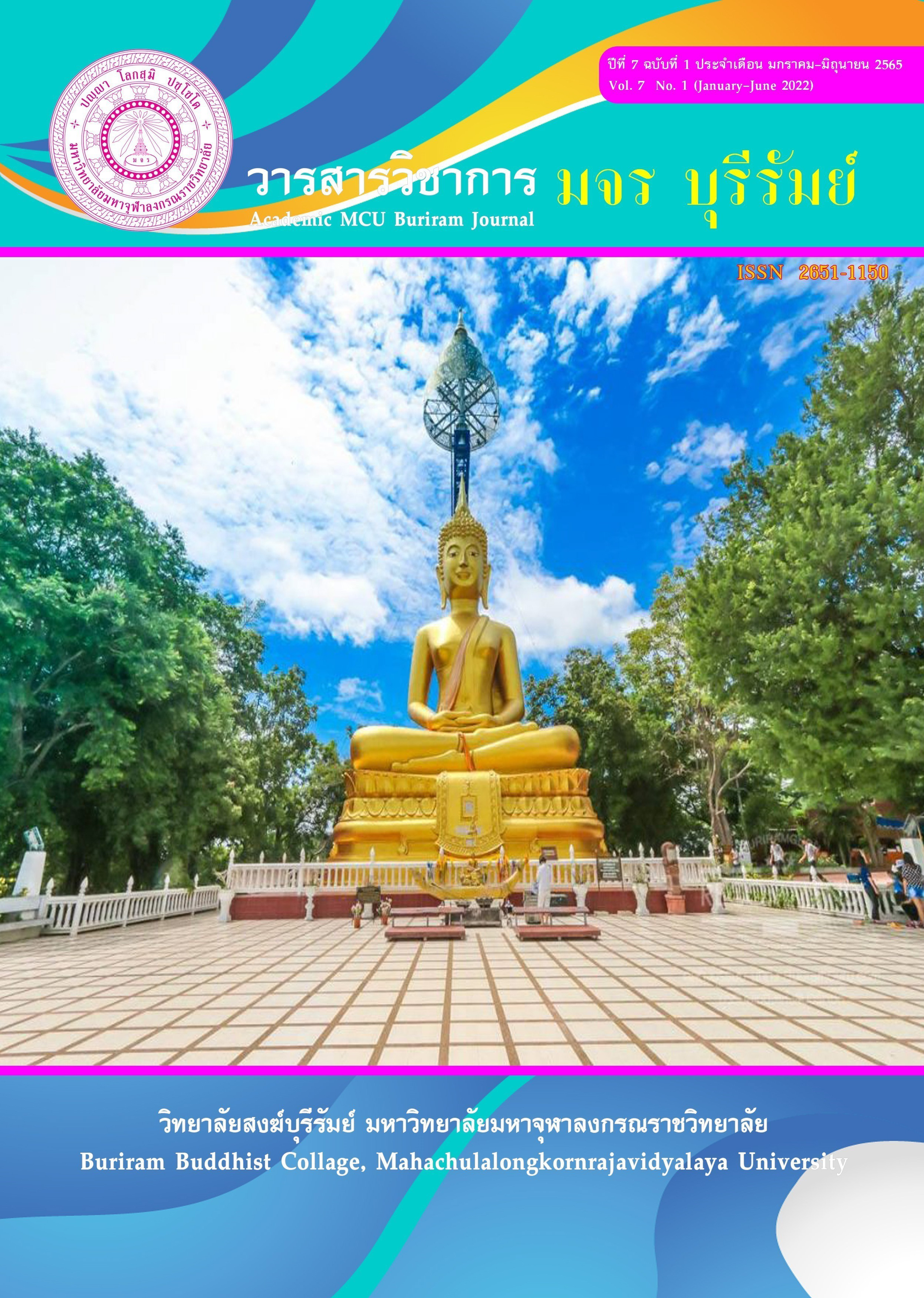The Conservation of Soil Resource of Sufficiency Economy Wisdom Group according to Buddhist Principles in Nakhon Ratchasima Province
Keywords:
Conservation, Soil of Resources, Wisdom of GroupAbstract
This research article has objectives : 1) to study of the soil resource conservation of the sufficiency economy wisdom group in Nakhon Ratchasima Province, 2) to study the problem condition of the soil resource conservation of the sufficiency economy wisdom group in Nakhon Ratchasima Province and 3) to propose a model of the soil resource conservation of the sufficiency economy wisdom group according to Buddhist principles in Nakhon Ratchasima Province by visiting the area for interviews and group discussions of 48 persons in 4 districts, namely Chokchai District, Nong Bun Mak District, Khorn Buri District and Wang Nam Khiew District, Nakhon Ratchasima Province to collect data for analysis and synthesis.
The results of research found that:
The soil resource conservation of the sufficiency economy wisdom group according to Buddhism in Nakhon Ratchasima Province, it found that (1) Chokchai District, the Organic Agriculture Group of New Developmental La Lom way, There is an ancient farming practice, (2) Nong Bun Mak District, there is an organic agriculture group as sustainable way, there is a doing agriculture under the sufficiency economy philosophy, (3) Khorn Buri District, there is a new agricultural group that has changed the way of life to organic agriculture. There are agricultures as Khok, Nong, Na and (4) Wang Nam Khiew District, there is a group of organic village, the soil resource onservation and the community will improve the soil to contain minerals.
The problem condition of the soil resource conservation of the sufficiency economy wisdom group in Nakhon Ratchasima Province, it found that 1) the problem condition of human resources is lack of cooperation, there is no sacrifice, it does not see the importance of organic farming, 2) the problem condition of natural disasters caused by drought, no rain, soil deterioration, drought, soil lacks fertility, soil collapse and soil erosion, 3) community problem condition, some communities have not yet participated or participated in activities. There is a stick to the old way and monopoly capitalists; and 4) social problems. social deprivation lack of arable land the capitalist system took over.
The soil conservation model of human resources should adhere to the principle of Hiri (moral shame)-Ottappa (moral dread) because it is a principle for protecting the world. People in the community will be ashamed or afraid of doing bad things and to prevent the soil conservation model of natural resources, to prevent humans from destroying nature or damaging soil resources. The soil conservation model of community holds Hiri (moral shame)-Ottappa (moral dread) are principles that can coexist in the community. This is also a reminder to people in the community not to destroy the soil to prevent conflicts in the community. The soil conservation model of society holds to live together in a good society with common activities. It is to respect the rules of coexistence in society.
References
เสรี พงศ์พิศ. (2554). เศรษฐกิจพอเพียง เกิดได้ถ้าใจปรารถนา. กรุงเทพมหานคร: เทียนวรรณ.
สัญญา สัญญาวิวัฒน์. (2536). สมเด็จพระเทพรัตนราชสุดาฯ สยามบรมราชกุมารีกับงานพัฒนา. กรุงเทพมหานคร: โครงการเผยแพร่ผลงานวิจัยจุฬาลงกรณ์มหาวิทยาลัย.
นางรุ้งลาวัลย์ แนบกระโทก. (14 มกราคม พ.ศ.2564). สมาชิกองค์การบริหารส่วนตำบลละลม ตำบลละลม อำเภอโชคชัย จังหวัดนครราชสีมา. สัมภาษณ์.
นายวรรณ เงินรวง. (มกราคม พ.ศ. 2564). กำนันตำบลหนองตะไก้ ตำบลหนองตะไก้ อำเภอหนองบุญมาก จังหวัดนครราชสีมา. สัมภาษณ์
นายจำนงค์ ทวนขุนทด. (มีนาคม พ.ศ. 2564). นักวิชาการส่งเสริมการเกษตรชำนาญการ อำเภอครบุรี ตำบลแซะ อำเภอครบุรี จังหวัดนครราชสีมา. สัมภาษณ์.
นายอำนาจ หมายยอดกลาง ต.น้ำซับ อ.วังน้ำเขียว จ.นครราชสีมา. สัมภาษณ์.
ว่าที่ร้อยตรี มหัคฆพล สุขสถิต. (14 มีนาคม พ.ศ. 2564). พัฒนาการอำเภอครบุรี ตำบลแซะ อำเภอครบุรี จังหวัดนครราชสีมา. สัมภาษณ์.
นายสิบตรีราช กั้นห้องกลาง. (7 มีนาคม พ.ศ. 2564). นายกองค์การบริหารส่วนตำบลวังน้ำเขียว ตำบลวังน้ำเขียว อำเภอวังน้ำเขียว จังหวัดนครราชสีมา. สัมภาษณ์.
นายราเชนทร์ เพียรดี. (10 มกราคม พ.ศ. 2564). เทศบาลตำบลหนองหัวแรด ตำบลหนองหัวแรด อำเภอหนองบุญมาก จังหวัดนครราชสีมา. สัมภาษณ์.
นางสาวกมลวรรณ กาฬโอฆะ. (7 มีนาคม พ.ศ. 2564). ตำบลวังน้ำเขียว อำเภอวังน้ำเขียว จังหวัดนครราชสีมา. สัมภาษณ์.
พระครูพิทักษ์ปทุมากร. (10 ธันวาคม พ.ศ.2563). เจ้าคณะอำเภอโชคชัย เจ้าอาวาสวัดใหม่สระปทุม ตำบลโชคชัย อำเภอโชคชัย จังหวัดนครราชสีมา. สัมภาษณ์.
พระครูปริยัติธรรมชัย เจ้าอาวาสวัดกุดจอกใหญ่ อำเภอโชคชัย, ดร.วิเชียร นามการ อาจารย์ประจำมหาวิทยาลัยมหามกุฎราชวิทยาลัย หน่วยบริการนครราชสีมา, นายอุดม ไตยเวียง อดีตนายกองการบริหารส่วนตำบลวังน้ำเขียว ตำบลวังน้ำเขียว อำเภอวังน้ำเขียว จังหวัดนครราชสีมา, นายธนพงษ์ พรมมานอก หมอดินอำเภอหนองบุญมาก,นายสลิด งามกระโทรก หมอดินอำเภอครบุรี อำเภอครบุรี, ดร.วทัญญู ภูครองนา อาจารย์ประจำมหาวิทยาลัยมหามกุฎราชวิทยาลัย หน่วยบริการ นครราชสีมา. (15 มกราคม พ.ศ. 2564). สนทนากลุ่ม.
นายราเชนทร์ เพียรดี. (10 มกราคม พ.ศ. 2564). เทศบาลตำบลหนองหัวแรต ตำบลหนองหัวแรต อำเภอหนองบุญมาก จังหวัดนครราชสีมา. สัมภาษณ์.
นายอุทัย หนูวุ่น. (14 มีนาคม พ.ศ. 2564). นักวิชาการส่งเสริมการเกษตรชำนาญการ ตำบลแซะ อำเภอครบุรี จังหวัดนครราชสีมา. สัมภาษณ์.
พระครูสิริชัยมงคล. (18 ธันวาคม พ.ศ. 2563). เจ้าคณะตำบลท่าเยี่ยม เจ้าอาวาสวัดหนองกระทุ่ม ตำบลท่าเยี่ยมอำเภอโชคชัย จังหวัดนครราชสีมา. สัมภาษณ์.
ผู้ช่วยศาสตราจารย์ ดร.วาสนา วงศ์ยิ้มย่อง. (14 ธันวาคม พ.ศ. 2563). อาจารย์คณะสังคมศาสตร์และมนุษย์ศาสตร์ มหาวิทยาลัยราชภัฏนครราชสีมา อำเภอเมือง จังหวัดนครราชสีมา. สัมภาษณ์.
Downloads
Published
How to Cite
Issue
Section
License
Copyright (c) 2022 Academic MCU Buriram Journal

This work is licensed under a Creative Commons Attribution-NonCommercial-NoDerivatives 4.0 International License.
ทัศนะและความคิดเห็นที่ปรากฏในบทความวารสารฉบับนี้ถือเป็นความรับผิดชอบของผู้เขียนบทความนั้น ไม่ถือเป็นทัศนะและความรับผิดชอบของบรรณาธิการ





